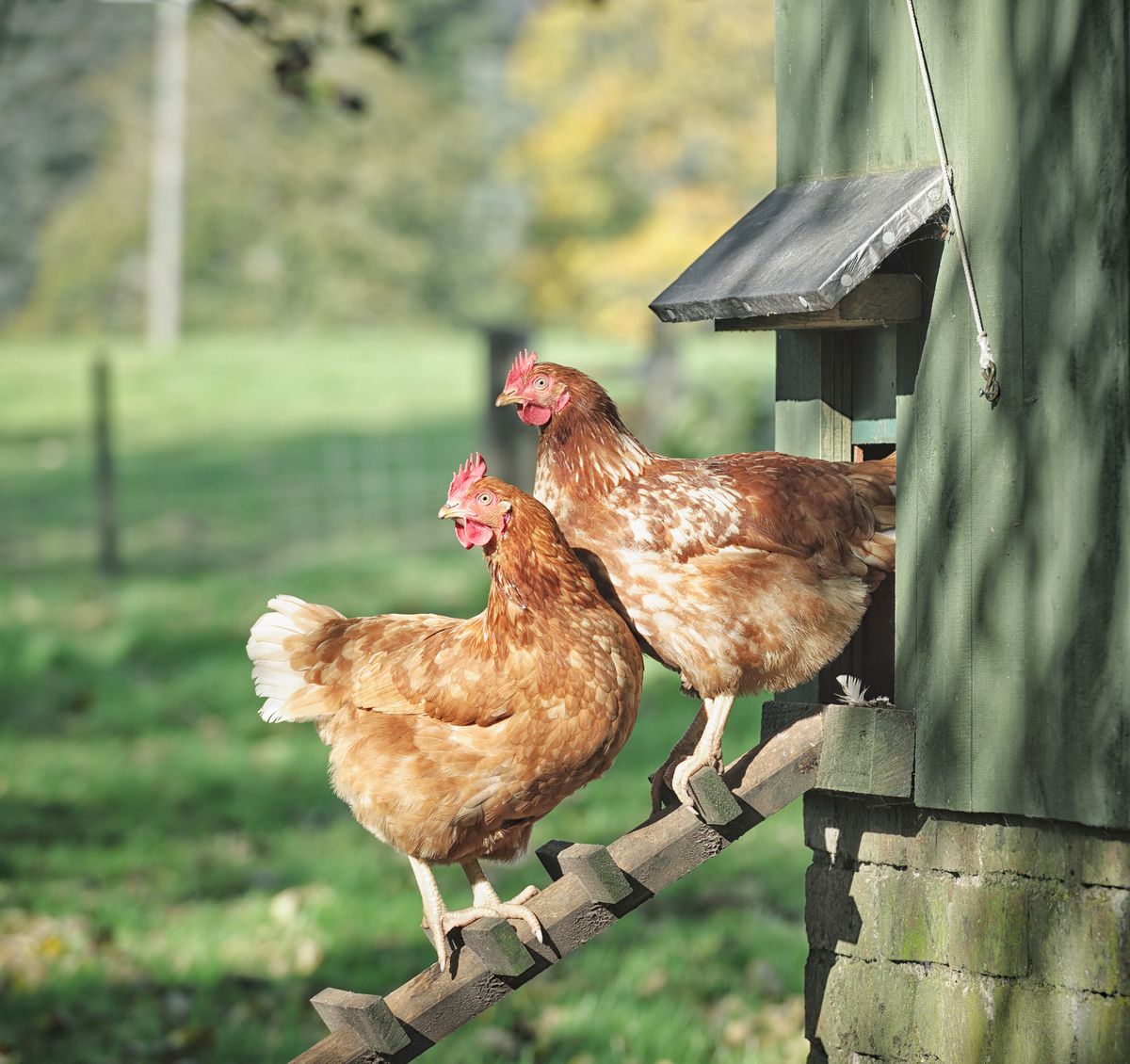For those seeking a useful way to spend their time during social distancing—or anyone simply interested in forging a deeper connection with their homes—HB has launched Home Love, a series of daily tips and ideas to make every minute indoors more productive (and gratifying!)
When warmer weather strikes, it's no surprise we're striving to maximize our outdoor space. And with eggs in low supply and pet adoptions skyrocketing, having a few fluffy chicks in the backyard is really starting to sound appealing. And we're not alone in this: Chris Pratt, the Hadids, and Kelly Clarkson are just a few of the celebrities who proudly own chickens. So, you itching to invest in a flock of your own? We've spoken to the experts to get you set up for probably the easiest backyard livestock you can own. Read on or click the links below to jump to different sections.
More From House Beautiful

How Much Space Do I Need to Keep Chickens?
Which Chicken Breed is Right For Me?
Can Chicken Survive in All Climates?
What Do Chicken Eat?
Can Chicken Make You Sick?
Should You Raise Chicken During the Coronavirus Pandemic?
How Much Space Do I Need to Keep Chickens?
Aside from a chicken coop, you'll need a good amount of fenced in area for them to roam outside. Chicken coops don't need to be expensive, but you'll need to budget out your space extra for larger flocks. Once grown, sweet chicks turn into competitive chickens that will fight for food, warmth or care. Give them the space to breathe and prevent chicken cliques from getting out of hand.
In addition to keeping your flock in, you'll need to keep would-be predators out. We're talking cats, opossums, hawks, and foxes. The last one is the trickiest. To keep all these animals out, you'll want your fence to operate more like a cage. The chicken wire fencing should cover the top to stop hawks and run on the floor to combat digging foxes. A heavy cloth or sturdy flooring are great alternatives to keep critters from tunneling to your chickens.
Unsure where to start with your DIY chicken coop? Virgina Tech's guide to small backyard chicken coops has information on square footage, ventilation. and blueprints for all kinds of backyard chicken farms.
Which Chicken Breed is Right For Me?
First step: What kind of chicken farmer do you want to be? Are you in it for the eggs or do you want to breed chicks as well? If you want to breed chickens, you'll need a rooster and permission from your neighbors. No one wants to be woken up early without warning. As a result urban and suburban would-be farmers should probably keep to egg farming, especially in quarantine.
Color, size, and frequency of egg laying all vary on chicken breed. Friendly, frequent egg-laying breeds like the Jersey Giant are more suited to families, but can take up more space. The College of Agriculture and Natural Resources at Michigan State University has a comprehensive list on chicken breeds. The updated sheet provides everything you'll need to choose your chicken breed including egg type and the perfect chicken coop.
Should loud wakeup calls not deter you, you should look at broodiness. When a hen is hatching eggs, she can lose the ability to eat, drink, or move for the sake of incubating chicks, so you may want to trade broodiness for friendliness. Some low broody birds aren't adaptable to human contact. Families with children or those who want chickens to double as domestic pets should consider aggressiveness in their breed selection. Early exposure to children and family life can help with chicken friendliness and is encouraged for even the nicest breed.
Can Chicken Survive in All Climates?
Chickens are hardy animals. Farmers have kept them in all 50 states—even Alaska and Texas have poultry alliances. Chickens have a high metabolism that can keep them warm even in fairly low temperatures. The main weather concern for chickens is any dampness. Wet bedding can breed mold, wet feathers can cause hypothermia, and wet combs and wattles can freeze. A well-ventilated and insulated chicken coop will prevent any moisture while helping the chickens keep themselves insulated.
If you're in an area that can dip into the single digits and below you'll need a few things.
- Heated water bowls or bases
- Heat source (think a heat lamp or coop radiator)
- Extra bedding
- Straw bales
Warmer summers are more of a threat to chickens than cold winters. Heat stress and heat stroke can prevent egg laying, cause sickness, and even kill your flock. Certain breeds are more suited for consistent warmer temperatures, but all chickens will move less during hot weather to conserve energy and stay cool. Keep your chickens moving by providing plenty of shade and re-filling their water trays with cool water regularly. A larger coop and outdoor area works not only to prevent infighting, but to prevent overheating from crowding. As with any animal, chickens should be checked on throughout the day to monitor for signs of heat stress.
What Do Chicken Eat?
Chicken eat a well-rounded omnivore diet and cannot survive on veggies alone. Chicken feed, usually sold as a mash or pellet, contains carbs, protein, fats, vitamins, and minerals in a combination of corn, sorghum, amino acids, and tallow. Supplements are touted by some chicken blogs and adopted by beginner backyard chicken farmers, but the results are mixed. A guide to chicken feed by Utah State University cautions against supplemental feeding after complete meals.
The list of supplements you should avoid include:
- Cracked corn or grains
- Lettuce or other greens
- Electrolytes for more than 10 days
Chickens should be given electrolytes as a supplement on extremely hot days as a bonus, but not continuously. The guide also cautions against fully free-range chicken diets in order to maintain health and egg production. It is safe for complete-fed chickens to eat grass and bugs on their own.
Can Chicken Make You Sick?
Chickens can sometimes get a bad rap. Carriers for Salmonella, Campyloterosis, and Avian Influenza, chickens can spread bacteria and disease under the radar, often with zero symptoms. While chickens can be swabbed for traces of infection, prevention is the best method for protecting you and your family from your chickens.
The World Small Animal Veterinary Association has a helpful one-sheet on handling chickens and preventing disease. Some helpful takeaways:
- Children under 5, those over 65, pregnant women, or those with compromised immune systems should not touch chickens or items used in the coop.
- Do not eat or drink near your chickens or chicken coop.
- Wash your hands or use hand sanitizer after touching chickens or materials that came in contact with your chickens or coop.
- Shoes, materials, and supplies used near chicken coops should remain outside and be cleaned outdoors first if they must be brought into the home.
- Do not kiss or snuggle your chickens.
Just like store-bought eggs, home-raised eggs and chickens must be cooked throughly. Do not consume raw chicken products, doughs, or undercooked poultry.
Worried about your chickens contracting avian dieases? The USDA's Animal and Food Inspection Service offers free Defend the Flock Program membership and resources dedicate to biosecurity for those raising chickens in their backyard.
Should You Raise Chicken During the Coronavirus Pandemic?
Production line disruptions are causing poultry shortages across the US and leading more than one family into the chicken trade, but you don't need a backyard chicken coop to get fresh eggs. Local farm-to-table organizations, co-ops, and even farm-based online services are making it easier to order meat and dairy directly from the famers themselves. Even farmer's markets have moved online.
If raising chickens for meat and eggs is more up your alley, you still need to follow coronavirus guidelines for farm animals. At this time the CDC has acknowledged that animal spread of the coronavirus remains minimal in their latest report on animal safety. However animals may be able to contract or carry COVID-19 in their fur. As a result, the CDC recommends maintaining a safe distance from pets and animals if you have been affected by the coronavirus and washing your hands after coming in contact with animals. The full CDC guide to animals and pets during the coronavirus pandemic can be found here.
Food is not a source of coronavirus infection according to the FDA. Eggs and meat cooked properly at a temperature of 165F are not a risk factor for coronavirus transmission. Keeping up normal safety procedures for raising chickens in your backyard chicken farm is the best way to harvest eggs and meat during the coronavirus pandemic.
Follow House Beautiful on Instagram.












